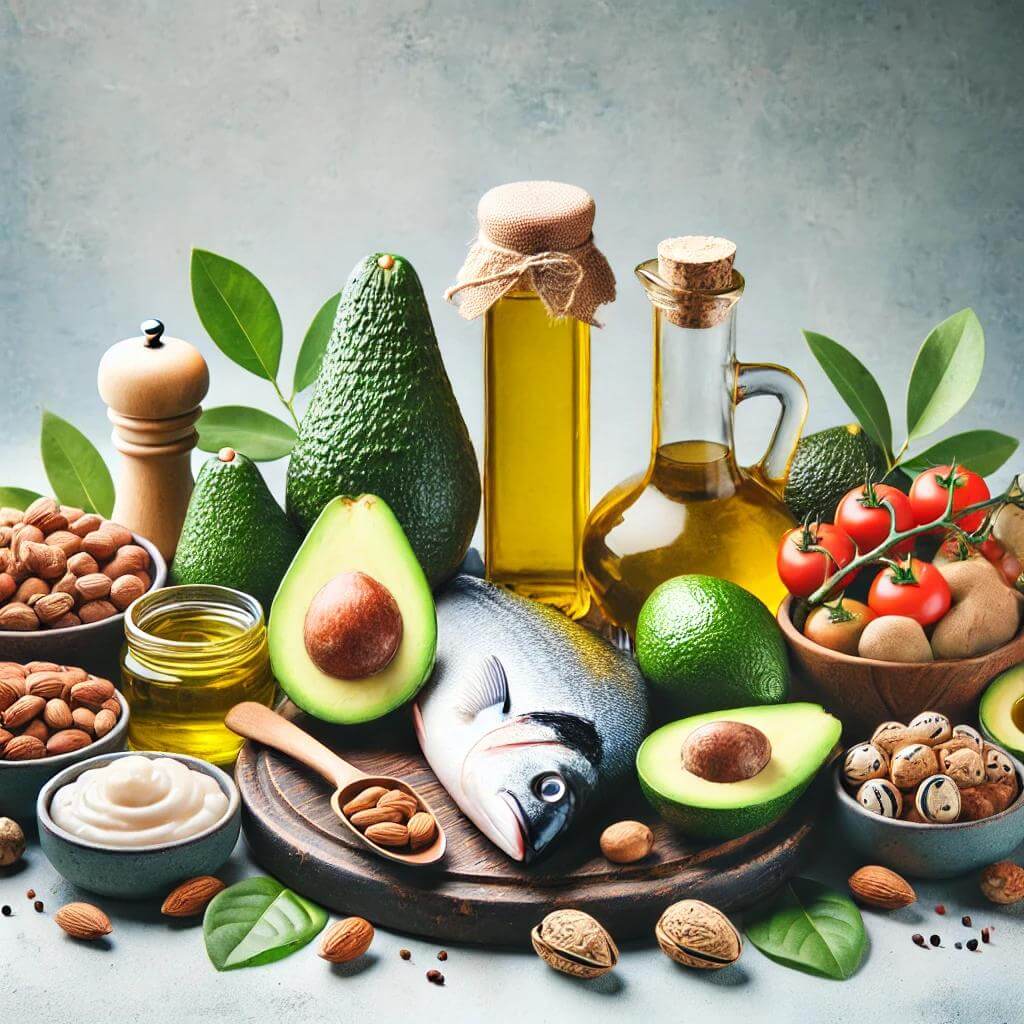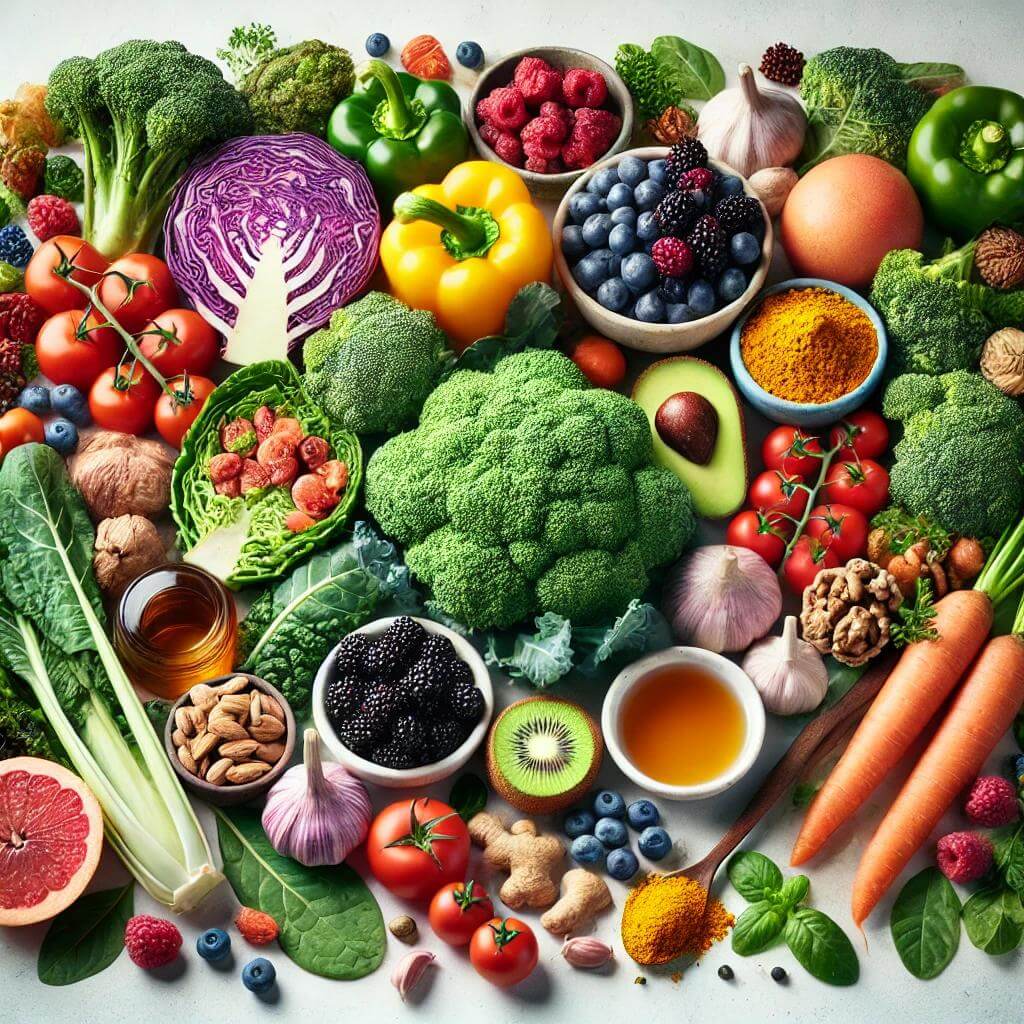Top 10 Foods for Healthy Fats: Why Good Fats Matter for Health
For years, fats were demonized as the root cause of weight gain and heart disease. However, not all fats are created equal. Healthy fats, particularly monounsaturated and polyunsaturated fats, play a crucial role in maintaining overall health. They support brain function, hormone production, and even help reduce inflammation. Understanding which foods are rich in these beneficial fats and incorporating them into your diet can lead to better health outcomes and a more balanced diet.
The Best Foods for Healthy Fat Intake
1. Avocados
Why They’re Important:
Avocados are a powerhouse of healthy monounsaturated fats, particularly oleic acid, which has been linked to reduced inflammation and improved heart health. Beyond fats, avocados are also rich in fiber, potassium, and vitamins C, E, and K, making them a well-rounded addition to your diet.
Nutritional Highlights:
- Monounsaturated Fats: Improve heart health and reduce inflammation.
- Fiber: Supports digestive health.
- Potassium: Helps regulate blood pressure.
How to Incorporate:
Add avocado slices to salads, sandwiches, or smoothies. Use mashed avocado as a spread on toast or as the base for guacamole.
2. Olive Oil
Why It’s Important:
Olive oil, particularly extra virgin olive oil, is renowned for its heart-healthy benefits. Rich in monounsaturated fats and antioxidants, olive oil can help lower bad cholesterol levels (LDL) while boosting good cholesterol (HDL). It also contains anti-inflammatory compounds like oleocanthal, which have been compared to ibuprofen in their efficacy.
Nutritional Highlights:
- Monounsaturated Fats: Support cardiovascular health.
- Antioxidants: Protect cells from damage.
- Anti-inflammatory Compounds: Reduce chronic inflammation.
How to Incorporate:
Drizzle olive oil over salads, use it in cooking, or as a dip for bread. It’s also great for roasting vegetables or as a base for homemade dressings.
3. Nuts (Almonds, Walnuts, and Macadamia Nuts)
Why They’re Important:
Nuts are an excellent source of both monounsaturated and polyunsaturated fats. Almonds are rich in vitamin E and magnesium, walnuts provide omega-3 fatty acids, and macadamia nuts are high in monounsaturated fats. Regular consumption of nuts has been linked to lower cholesterol levels, improved heart health, and better brain function.
Nutritional Highlights:
- Monounsaturated and Polyunsaturated Fats: Support heart and brain health.
- Omega-3 Fatty Acids (Walnuts): Reduce inflammation.
- Vitamin E (Almonds): Acts as a powerful antioxidant.
How to Incorporate:
Enjoy a handful of nuts as a snack, add them to yogurt or oatmeal, or use them in baking. Nut butters like almond or walnut butter are also delicious and nutritious options.
4. Fatty Fish (Salmon, Mackerel, Sardines)
Why They’re Important:
Fatty fish are among the best sources of omega-3 fatty acids, which are essential for heart and brain health. Omega-3s help reduce inflammation, lower blood pressure, and decrease the risk of heart disease. Fatty fish also provide high-quality protein and various essential nutrients like vitamin D and selenium.
Nutritional Highlights:
- Omega-3 Fatty Acids: Essential for reducing inflammation and supporting heart health.
- Protein: Aids in muscle repair and overall bodily function.
- Vitamin D and Selenium: Support bone health and immune function.
How to Incorporate:
Include fatty fish in your meals at least twice a week. Grill, bake, or broil fish like salmon or mackerel, or add sardines to salads and sandwiches.
5. Chia Seeds
Why They’re Important:
Chia seeds are packed with omega-3 fatty acids, fiber, and protein, making them a fantastic superfood for overall health. These tiny seeds expand in water, forming a gel-like substance that slows digestion and helps stabilize blood sugar levels.
Nutritional Highlights:
- Omega-3 Fatty Acids: Support heart and brain health.
- Fiber: Promotes digestive health and regulates blood sugar.
- Protein: Supports muscle repair and satiety.
How to Incorporate:
Add chia seeds to smoothies, yogurt, or oatmeal. They can also be used to make chia pudding or added to baking recipes.
6. Flaxseeds
Why They’re Important:
Flaxseeds are one of the richest plant-based sources of omega-3 fatty acids, particularly alpha-linolenic acid (ALA). They also contain lignans, which have antioxidant properties and can help lower the risk of cancer. The high fiber content in flaxseeds supports digestive health and can aid in weight management.
Nutritional Highlights:
- Omega-3 Fatty Acids: Improve heart health and reduce inflammation.
- Lignans: Provide antioxidant benefits.
- Fiber: Supports digestive health and aids in weight management.
How to Incorporate:
Ground flaxseeds can be added to smoothies, sprinkled on cereal, or mixed into baked goods. Whole flaxseeds can also be used, but they need to be ground for the body to absorb their nutrients effectively.
7. Coconuts and Coconut Oil
Why They’re Important:
Coconuts and coconut oil are unique sources of medium-chain triglycerides (MCTs), which are metabolized differently from other fats. MCTs are quickly converted into energy and have been shown to support weight loss and brain health. While coconut oil is high in saturated fat, the type of saturated fat in coconuts is considered healthier than those found in animal products.
Nutritional Highlights:
- Medium-Chain Triglycerides (MCTs): Provide quick energy and support weight loss.
- Saturated Fats: Different from those found in animal products, potentially healthier.
- Lauric Acid: Has antimicrobial properties.
How to Incorporate:
Use coconut oil for cooking or baking, add coconut milk to smoothies or curries, or enjoy shredded coconut as a topping for yogurt or oatmeal.
8. Dark Chocolate
Why It’s Important:
Dark chocolate, particularly varieties with 70% or higher cocoa content, is rich in monounsaturated fats, antioxidants, and minerals like magnesium and iron. The flavonoids in dark chocolate have been shown to improve heart health by lowering blood pressure and reducing the risk of heart disease.
Nutritional Highlights:
- Monounsaturated Fats: Improve heart health.
- Flavonoids: Reduce blood pressure and inflammation.
- Magnesium: Supports muscle and nerve function.
How to Incorporate:
Enjoy a small piece of dark chocolate as a treat, or use it in baking or as a topping for fruit and yogurt.
9. Eggs
Why They’re Important:
Eggs are a versatile and nutritious source of healthy fats, particularly when the yolks are included. They provide a good balance of monounsaturated and polyunsaturated fats, along with high-quality protein and essential vitamins and minerals. Despite past concerns, research shows that moderate egg consumption does not increase heart disease risk and may even support eye health due to the presence of lutein and zeaxanthin.
Nutritional Highlights:
- Monounsaturated and Polyunsaturated Fats: Support overall health.
- High-Quality Protein: Aids in muscle repair and growth.
- Lutein and Zeaxanthin: Support eye health.
How to Incorporate:
Enjoy eggs boiled, scrambled, poached, or baked. They can be eaten alone or added to salads, sandwiches, and various dishes.
10. Full-Fat Dairy Products (Cheese, Yogurt)
Why They’re Important:
Full-fat dairy products like cheese and yogurt are rich in beneficial fats, particularly conjugated linoleic acid (CLA), which has been linked to weight loss and improved heart health. These products also provide calcium, vitamin D, and probiotics, which support bone and gut health.
Nutritional Highlights:
- Conjugated Linoleic Acid (CLA): Supports heart health and weight management.
- Calcium and Vitamin D: Essential for bone health.
- Probiotics (in yogurt): Support gut health.
How to Incorporate:
Include full-fat yogurt in your breakfast, use cheese in salads and sandwiches, or enjoy it as a snack with nuts and fruit.
Summary Table of Foods for Healthy Fat Intake
| Food | Key Nutrients | Health Benefits | Ways to Include |
|---|---|---|---|
| Avocados | Monounsaturated fats, fiber, potassium | Reduces inflammation, supports heart health | Slices in salads, sandwiches, smoothies, guacamole |
| Olive Oil | Monounsaturated fats, antioxidants, anti-inflammatory compounds | Lowers LDL cholesterol, boosts heart health | Salad dressing, cooking, dip for bread |
| Nuts (Almonds, Walnuts, Macadamia Nuts) | Monounsaturated and polyunsaturated fats, omega-3 (walnuts), vitamin E (almonds) | Supports heart and brain health, reduces cholesterol | Snacks, yogurt, oatmeal, baking |
| Fatty Fish (Salmon, Mackerel, Sardines) | Omega-3 fatty acids, protein, vitamin D, selenium | Reduces inflammation, supports heart and brain health | Grilled, baked, in salads or sandwiches |
| Chia Seeds | Omega-3 fatty acids, fiber, protein | Stabilizes blood sugar, supports heart health | Smoothies, yogurt, oatmeal, chia pudding |
| Flaxseeds | Omega-3 fatty acids, lignans, fiber | Supports heart health, reduces inflammation | Ground in smoothies, cereal, baking |
| Coconuts and Coconut Oil | Medium-chain triglycerides (MCTs), lauric acid | Provides quick energy, supports weight loss and brain health | Cooking, baking, smoothies, shredded in yogurt |
| Dark Chocolate | Monounsaturated fats, flavonoids, magnesium | Improves heart health, reduces blood pressure | As a treat, in baking, with fruit |
| Eggs | Monounsaturated and polyunsaturated fats, protein, lutein, zeaxanthin | Supports muscle growth, eye health, overall health | Boiled, scrambled, poached, in salads or sandwiches |
| Full-Fat Dairy Products (Cheese, Yogurt) | Conjugated linoleic acid (CLA), calcium, vitamin D, probiotics | Supports bone health, weight management, gut health | Yogurt for breakfast, cheese in salads or as a snack |
Conclusion
Incorporating these foods into your diet can significantly boost your intake of healthy fats, leading to improved heart health, brain function, and overall well-being. From avocados and olive oil to fatty fish and nuts, these nutrient-dense options provide essential fats that your body needs to function at its best. Remember that balance is key, so enjoy these foods as part of a varied and nutritious diet.
*Disclaimer: The information provided in this article is for educational and informational purposes only and should not be construed as health advice. The content is solely the personal opinion of the author and is not intended to be a substitute for professional medical advice, diagnosis, or treatment. Always seek the advice of your physician or other qualified health provider with any questions you may have regarding a medical condition or before starting any new diet or treatment. Read more




Post Comment